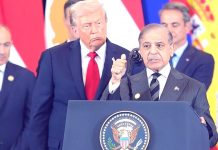ISLAMABAD, May 11 (TNS): Over eight million trees had been planted through Green Pakistan Programme (GPP) all over the country with an objective to facilitate the transition towards environmentally resilient Pakistan.
According to an official of Ministry of Climate Change, the plan was initiated by mainstreaming notions of adaptation and mitigation through ecologically targeted initiatives covering forestation biodiversity and conservation.
He said the government’s drive to enhance the forest coverage of Pakistan through Green Pakistan Program (GPP) was launched in 2017. The Punjab Forest Department has launched the programme by planting 100,000 seedlings over a range of 138 sections of land, situated in around 19 areas of the province besides 1.41 million trees were planted.
In Sindh during tree plantation campaign under ‘Green Pakistan Programme,’ about 2.281 seedlings have been planted out of 1.54 million plants at various rural regions of Sukkur and Khairpur. The District Chairmen, other local administration, Local Support Organizations, Village Organizations, students and common society associations participated in this drive as a team with Sindh Rural Support Organization (SRSO).
He added in Bolochistan 0.364 million plants were planted out of 6,210 million over a range of 2737 hector. In Gligit Baltistan, 0.2485 trees were planted out of 6.210 million over a range of 2737 hector.
In Azad Jammu Kashmir 2.553 trees were planted while in FATA 0.
buy viagra soft online https://www.calmandgentledentalcare.co.uk/wp-content/languages/en/viagra-soft.html no prescription
286 trees were planted. He said for Green Pakistan Programme, the government is bearing 50% of the cost of the project, while every province will contribute 50% for each rupee spent.
Through the programme, 100 million trees will be planted all around the country. The programme intends to plant indigenous tree species to monitor and advance the local flora of Punjab.















